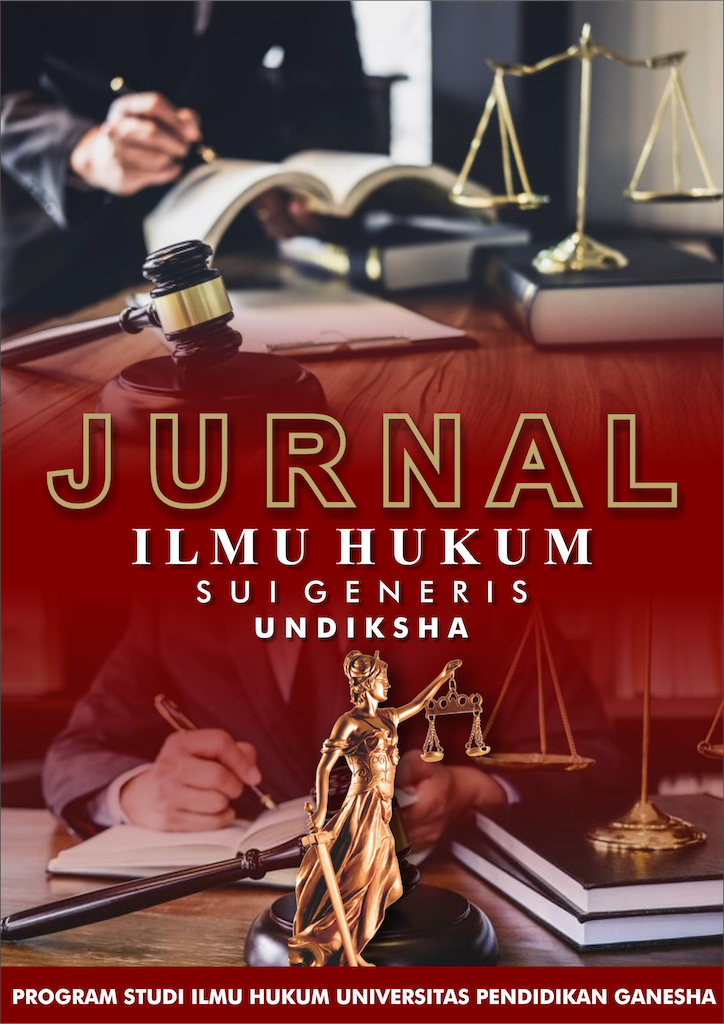IMPLEMENTASI KETENTUAN PASAL 18 UNDANG-UNDANG NOMOR 8 TAHUN 1999 TENTANG PERLINDUNGAN KONSUMEN TERKAIT PENGGUNAAN KLAUSULA EKSONERASI PADA BUKTI TRANSAKSI BARANG DI KOTA SINGARAJA
DOI:
https://doi.org/10.23887/jih.v5i2.5052Keywords:
klausula baku, klausula eksonerasi, jual beliAbstract
This study aims to analyze and review the implementation of the provisions of Article 18 Paragraph (1) of Law Number 8 of 1999 concerning Consumer Protection against the Use of Exoneration Clauses in goods businesses in Singaraja City. In practice, business actors reject the demands of consumers who experience losses due to the products they sell. The refusal of business actors is stated in the form of an exoneration clause on the proof of transaction. The type of research used in this study is empirical juridical research that is descriptive. The determination of the sample used is non-probability sampling in the form of snowball sampling. Data collection techniques are carried out by observation, interviews, questionnaires, and document studies. Based on the research conducted, it can be seen that the implementation of the provisions of Article 18 Paragraph (1) of Law Number 8 of 1999 concerning Consumer Protection has not been effectively implemented by goods business actors in Singaraja City in Singaraja due to weak supervision carried out by legal structures and weak legal culture of the community, namely business actors and consumers related to understanding of the provisions for the use of standard clauses. The factors that cause business actors to include exoneration clauses in their transaction proofs are business actors' concerns about consumer behavior in bad faith, business policies, lack of legal awareness of business actors on the use of exoneration clauses, and the absence of socialization regarding the use of standard clauses.
References
Ardhya, S. (2019). PRODUCT LIABILITY DAN RELEVANSI KLAUSULA BAKU YANG MENGANDUNG EKSONERASI DALAM TRANSAKSI GITAR ELEKTRIK. 1(2), 90–105.
Ardhya, S. N., Dantes, K. F., Studi, P., Hukum, I., & Ganesha, U. P. (2022). BERDASARKAN PRINSIP MENYAMA BRAYA DI DESA TIGAWASA. 5, 128–139.
Dantes, K. F., Ketut, N., Adnyani, S., Ganesha, U. P., Marketing, T., & Marketing, W. T. (2023). TINJAUAN YURIDIS TERHADAP PENGINGKARAN PERJANJIAN KERJASAMA ( STUDI KASUS PADA WORLD TRAVEL MARKETING CO ., LTD . KOREA KEPADA PT . CAMPUHAN AGUNG ). 3, 57–68.
Ibrahim, J & Efendi, J. (2016). Metode Penelitian Hukum Normatif Dan Empiris (Edisi Pertama). In Kencana (1st ed., Vol. 2, Issue Hukum). Kencana.
Kartini, S. (2019). Kesadaran Hukum (Ade (ed.)). ALPRIN.
Kristiyanti, C. (2022). Hukum Perlindungan Konsumen (Tarmizi (ed.); 1st ed.). Sinar Grafika.
Muttaqin, F. A., & Saputra, W. (2019). Budaya Hukum Malu Sebagai Nilai Vital Terwujudnya Kesadaran Hukum Masyarakat. Al-Syakhsiyyah: Journal of Law & Family Studies, 1(2), 187–207. https://doi.org/10.21154/syakhsiyyah.v1i2.2026
Nurfitrah, M. (2023). Janji Menikahi Yang Mengikat Dalam Kaitannya Dengan Asas Pacta Sunt Servanda. Jurnal Usm Law Review, 6(1), 79. https://doi.org/10.26623/julr.v6i1.5848
Qurratu, D., & Yusuf, A. (2022). Perlindungan Konsumen Terhadap Klausula Eksonerasi Dalam Perjanjian Baku Perusahaan Jasa Pengiriman Barang ( Studi Pada Perusahaan Pengiriman Barang Di Kota Binjai PT . JNE ). 8, 203–213.
Peraturan Perundang-Undangan
Undang-Undang Dasar Negara Republik Indonesia Tahun 1945 (Lembaran Negara Republik Indonesia Nomor 1 dan Tambahan Lembaran Negara Republik Indonesia Nomor 1)
Undang-Undang Nomor 23 Tahun 1848 tentang Kitab Undang-Undang Hukum Perdata (Lembaran Negara Republik Indonesia Nomor 161 dan Lembaran Tambahan Negara Nomor 330)
Undang-Undang Nomor 8 Tahun 1999 tentang Perlindungan Konsumen (Lembaran Negara Republik Indonesia Nomor 42 dan Tambahan Lembaran Negara Republik Indonesia Nomor 3821)


